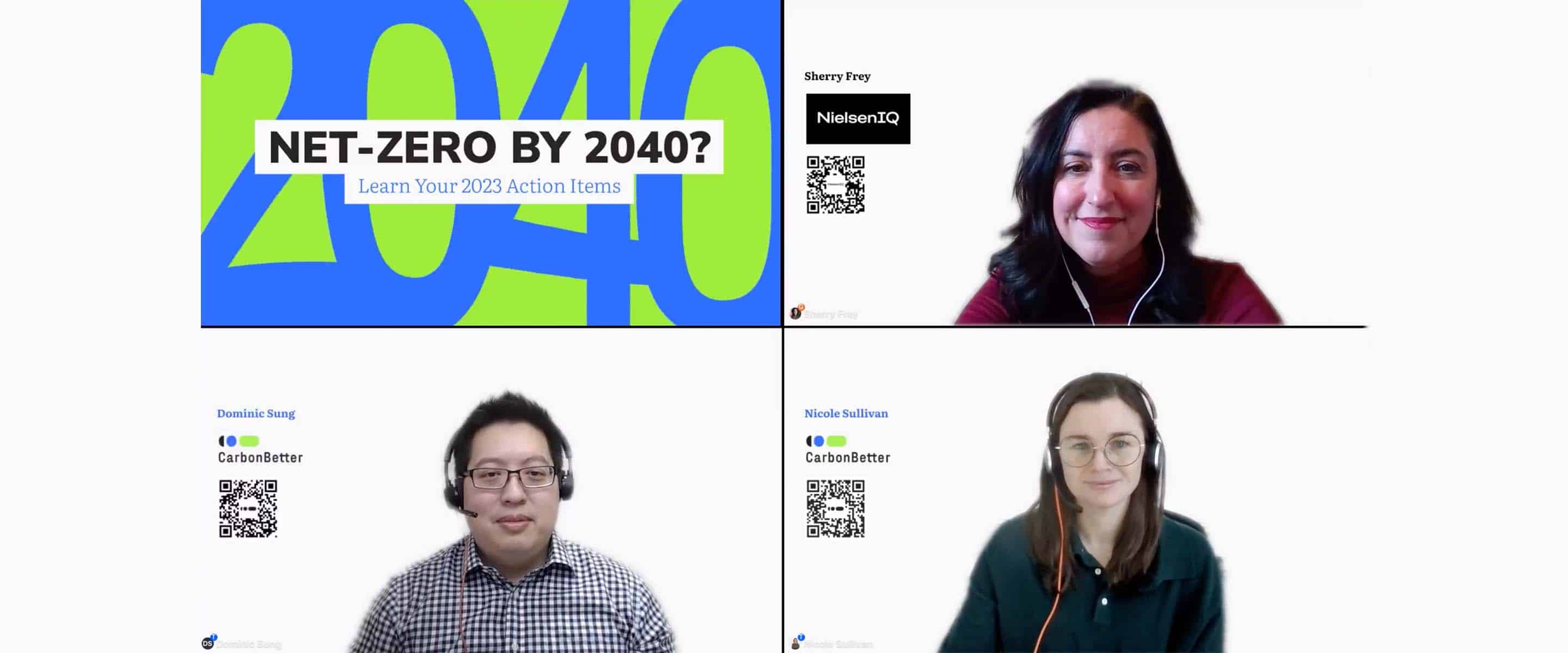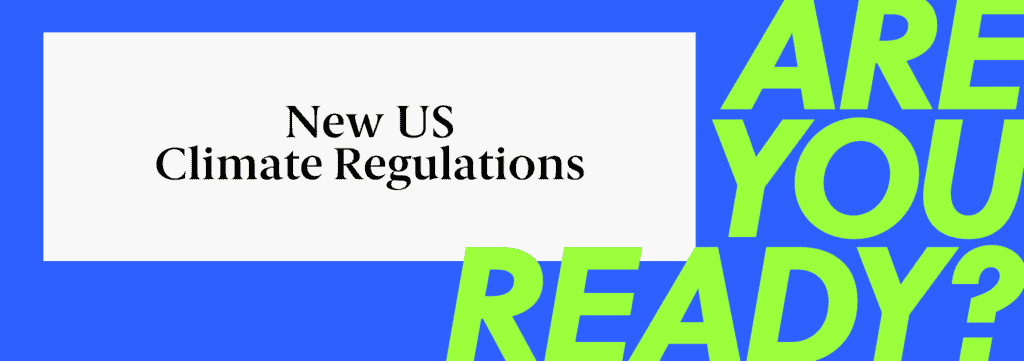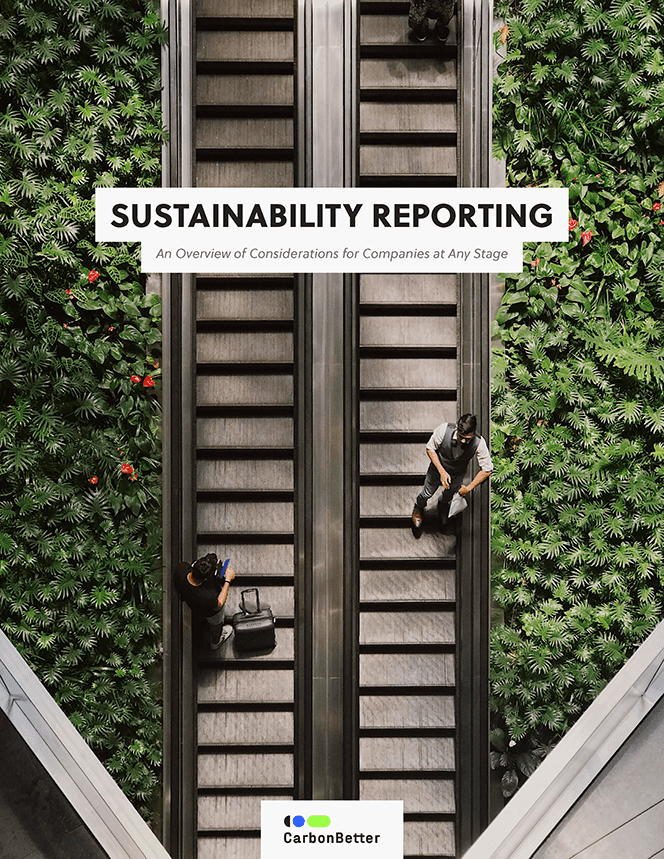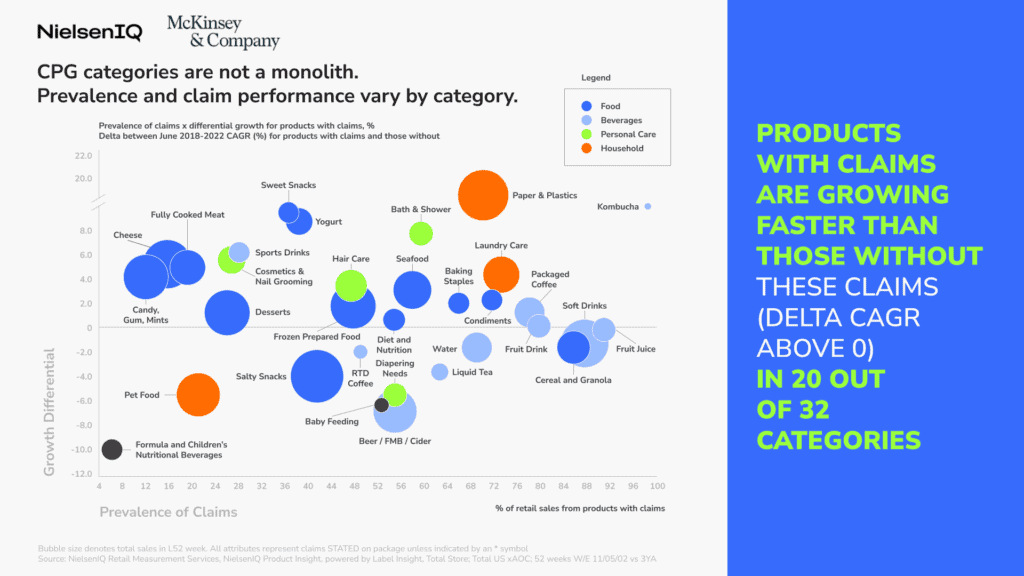Webinar Recap: Want to Achieve Net-Zero by 2040? Learn Your 2023 Action Items


As climate-related disclosure and mitigation requirements continue to evolve, understanding the latest regulatory landscape is essential for US companies. In this webinar, we cut through the jargon to provide clear insights into emerging climate-related requirements, breaking down two key federal proposals and one EU regulation impacting some US-based companies. Join us to stay informed and prepared for what’s ahead in climate compliance.
Why it’s more important than ever to be transparent with consumers about sustainability progress.
Last week, we were joined by Sherry Frey of NielsenIQ to explore the latest data regarding sustainability claims by industry, how consumer perceptions about sustainability are changing, ways to prioritize and plan work in 2023 to achieve 2040 goals, and how to confidently make claims even in high-growth organizations with rapidly expanding footprints. We also discussed the challenges of navigating evolving regulatory landscapes, aligning internal stakeholders, and integrating sustainability into core business strategies. This recap post will include some highlights from the conversation, but don’t miss the full replay for more insights.
WATCH THE WEBINAR REPLAY
Missed the live webinar? Watch the reply anytime to learn more about what 2023 action items can be done to make sure you meet your net-zero by 2040 goals.
WATCH NOWOn Sustainability Becoming More Important to Consumers
Dominic: 702 companies on the Fortune 2000 have made some form of net zero pledges as of mid-2022, but there’s a massive difference between making a pledge and achieving that goal. We are here today to talk through what customers are looking for out of companies, and for those that have made pledges the importance of taking direct decisive action towards achieving them. Sherry, what are you seeing in recent data from NielsenIQ about whether sustainability is becoming more important to consumers?
Sherry: We continue to see that sustainability is more important to consumers. We’ve been tracking this for a long time, and we saw a spike during the pandemic. I think one of the reasons was it was hard to deny climate change when we all stopped commuting in March of 2020, and we saw that physical impact on our environment. But from a consumer perspective—we actually just released some global research—consumers are telling us they’re actually being impacted by it. In fact, 61% of consumers have said, “I think the environment is having a negative impact on my health.”
While we look at this from a total wellness perspective here at NielsonIQ, [consumers] really are merging the idea that their personal wellness and the wellness of the planet are very intertwined. One of the things that we are seeing, though, is what consumers are calling sustainability, and what businesses are calling sustainability kind of varies a little bit.
Globally, we found there was a consistency from consumers that, at the top, when they think about sustainability, they’re looking at things like the environment: reducing pollution, a cleaner environment, or protecting natural resources. But, Nicole and Dominic, it was interesting because even what consumers said was sustainability varied across the country. So, we saw developing markets actually included even more socially responsible things like better working conditions for workers or giving back to society.
Nicole: Yeah, that’s such an important point. It’s a word that’s thrown around so much, but it truly means different things to different people, and different businesses, and so it’s a word that can be hard to define. The United Nations (UN) defined it back in 1987, but otherwise, it’s kind of at everyone’s discretion to define “sustainability” and what it means for them. So, I love that you touched on that.
Sherry: Yeah, I mean, it was interesting, too, because we ask consumers, “What are you doing to live a sustainable lifestyle?” And we’re starting to hear more and more of like, “I’m eating a climate-friendly diet.” Those sorts of things are starting to percolate up. But, really, the top things that consumers say when we ask them, “What are you doing day in and day out?” For them, it’s around, “I’m taking a reusable shopping bag,” or “I’m trying to minimize or avoid my waste,” or “I’m watching my energy usage, and I’m recycling, and I’m eating leftovers, and I’m looking at packaging.” Those kind of seem to be the ones that they’re putting at the top of their list when they say, “This is what I’m doing in terms of taking responsibility.” But we really do know, and I think this is a big part of today’s conversation, they really are putting it back on brands and retailers. 46% of consumers are saying we actually expect brands to be leading the way on sustainability for us.
On Consumers’ Trust of Sustainability Claims
Dominic: So regardless of how someone defines that for themselves in terms of what sustainability is, Nicole, if sustainability is becoming more important and more companies are making sustainability claims, do you think consumers trust sustainability claims?
Nicole: I think there’s clear evidence that consumers don’t trust claims. They put their sustainability initiatives out there in such a way that people are highly aware of those initiatives, but there’s actually data that shows that consumers don’t feel they know enough about a brand’s sustainability claims, and they don’t feel like they have enough information, to validate that claim. In the United States (US), more than 50% of consumers don’t feel that they have sufficient information to trust a brand’s sustainability claim or a product claim. It’s actually particularly relevant in the beauty industry where 79% of shoppers have doubts about the claims, and I guess I would say that consumers are right to be skeptics in this case.
I’ve spent my career doing math on environmental impacts—really heavily in carbon—and I see carbon footprints all the time, or someone putting a number out, “Here are my emissions,” and I, personally, as a consumer, don’t feel like I have the data to recreate their math or to trust their math. Like, here’s a number, but there are so many different ways to do math: there are different emission factors, there are different data inputs, and then there are also different boundaries. You’re carbon neutral, let’s say: Are you carbon neutral for your Scope 1 emissions? Are you carbon neutral for Scope 1, 2, and 3? All of those things are important to making progress, but they’re also very different levels of effort. They encompass very different things.
So, I do really believe traceability and transparency are hugely important in making claims. I feel like in a lot of cases people don’t always have the data or the information to trust those claims. I think it’s important for brands that are making claims to back that up and tell people how they got there, showing people their progress in a really trustworthy way. So, yes, both data and myself feel like there’s a lot of concern around trusting claims today.

“I think the exciting thing for us in the research is that it did prove out that there is a business case for sustainability, but it also proved out that everybody—really across the board—can play in the sustainability space.”
Sherry Frey, VP of Total Wellness at Nielsen IQ, on the Business Case For Sustainability

SUSTAINABILITY REPORTING OVERVIEW
Sustainability reporting serves as a valuable tool to achieve corporate commitments and better manage climate-related business risks. This white paper walks you through what's typically included and what should be considered.
Before Making a Sustainability Claim or Commitment
Dominic: Nicole, if you haven't made a public claim or commitment yet, what are some steps you should take prior to making a claim?
Nicole: So before you make a claim or set a public target that you're publishing and putting out in the world, a really important first step is actually understanding your environmental baseline. So what are your carbon, water, and waste impacts for a single year that's representative of typical operations? And don't panic if you've set a target and you haven't done those things yet. But those things are really paramount to being able to make a claim that you're able to back up. So, if you haven't done your math, how will you track progress toward your target? I would say, bottom line, step one, you have to know your impacts and where you're at today. And then if you've set a target at some future date, you should be regularly and routinely tracking your impacts and comparing them back to that baseline year to see your progress towards that target.
That's one way to prepare. Another way to prepare is to consider your business's expansion plans and understand your supply chain. If you're going to set a target, or you've made a claim, or you're looking to make a claim, you've got to consider your operations today and where you're at, but you've also got to think through complexities in your operations if you're planning to ramp up production. Basically, once you've made those targets and made those claims any expansions or any changes to your business, you'll want to make sure that those changes actually align with your targets and that you're able to expand in a way that doesn't set you back on your goals.
And then lastly, doing your environmental baseline, making claims, setting targets, that can be really resource intensive. Maybe you have a sustainability role already on staff, or maybe you're looking to hire someone to be able to do this, or you need third-party resources. Actually planning for that and working that into your budget is a really important part of a sustainability journey, because once you take action you're going to continue to take action and make progress, and that takes time and resources. So, having a really good plan for that and knowing that you have resources allocated to that can help set you up for success on that journey.
Dominic: I think forward-thinking and forethought and planning for all this are really, really vital. Particularly if you're stepping into this arena for the first time. In a lot of cases, it may seem particularly daunting for those that feel they're not equipped or don't have the experience in it.
Nicole: Yeah, and I'd like to actually add one more point, too. We're seeing a lot of people set future targets, as far out as 2040 or even 2050, and that's great, but I think something else that I would like to see more of in the space is people setting interim milestones so that they really are on track with reaching those targets and backing those claims.
Dominic: I think that's really important as you're setting things that far out that there are milestones along the way. And obviously, as those things are years, sometimes decades, out into the future, it's a moving target. And you need to make adjustments, so those milestones are really important check-ins to adjust as you go.
On Sustainability Progress Driving Growth
Dominic: Sherry, there are so many factors to consider when somebody's running a business. Can sustainability progress drive growth, or is it just another cost?
Sherry: That's probably one of the biggest questions we get, and we know the stakeholder expectations are growing for so many brands. But, it's often really hard to make the business case, or we've made this big investment, and it actually hasn't made an impact for us, so we looked at the last five years of data across the store. We looked across all categories in the store, about half a million products, $400 billion in retail sales, to answer the question, "Does it drive growth?" And what we found overall is that the answer is yes, there is a greater growth across the categories.

Over the last five years, they had about 170 basis points more growth than products that didn't have sustainable claims. But again, it wasn't super simple. It's not that it's an answer of you can just slap "x" or slap "y" on your package. But we wanted to show you here just a little bit of the lay of the land of where the categories in the store are falling and the horizontal access here.
So, you can see household products and paper and plastics—actually a lot of claims up there in that upper right-hand quadrant—and then on the vertical axis, that shows where we're seeing the growth. And then there are categories like you can see pet food in the bottom left, where there are not a lot of claims today, and the ones that are aren't driving incremental growth.
And so, to answer your question, at a high level, we did find that, yes, it really does drive greater growth, and what we're finding is it again varies as you can see here, across categories. But we saw a lot of growth interestingly with private label. We also saw as we expected a lot of the challenger brands that were driving the growth, but we even saw on large brands and established brands, they were able, the sustainability claims were able to really drive a differentiated role for a big brand. I think the exciting thing for us in the research is that it did prove that there is a business case for sustainability, but it also proved that everybody—really across the board—can play in the sustainability space.
The Biggest Hurdle to Meeting Net-Zero Goals
Dominic: So, what do each of you see as the biggest hurdle and opportunity with companies setting and reaching their targets? And maybe Nicole, you could lead us off, and then Sherry you could go after Nicole.
Nicole: Sure. There are a lot of hurdles that can make it hard for folks to even get started. Right in the face of so much pressure to set targets and take action, I really feel like there's an information and education hurdle. So, getting access to train with resources that know how to quantify your impacts—and being able to set pragmatic targets, or even learning how the voluntary carbon market works as a tool for action—can be really overwhelming for people. We're seeing increased pressure from consumers, stakeholders, investors, and then also upcoming regulatory pressures. So, everyone's looking to make a claim, but I don't feel that people always understand the pathway to meet their claims. And so I do think a lot of that's educational, and helping these people make progress and understand how to get there is actually really one of my favorite parts about my job at CarbonBetter.
I actually really see beyond doing math. Educating folks on how to take action and make progress is a huge part of my job, and one that I am most excited about. And then from an opportunity perspective, I really feel like people who are frontrunners in their industry and making claims have a lot of opportunity to drive innovation and inspire action from their competitors. Being one of the first folks in whatever space you're operating in to make a claim: that in and of itself, by putting your data out there publicly, by sharing your math, by setting this target, you can inspire your competitors to do the same. We've all seen there is no easy button in solving the climate crisis, and there's no one size fits all solution. Decarbonization looks very different depending on your industry. So, I really see a lot of opportunities to innovate, to think creatively as well as collaborate.
Sherry: I love that, Nicole. From an obstacle standpoint, I think one of the things that we're kind of seeing as a hurdle for the industry is where we're seeing sustainability departments kind of being separate. We think that that's really going to continue to be a challenge if we keep kind of this isolated approach and not fully integrated. We also kind of think a hurdle is when we also have marketing departments come and say, "Hey, we want to use sustainability as a marketing claim." It's really not. It's everything, right? It's across the entire business. So we think it's really key that the companies think that way, and it's going to inspire new innovations, and it's going to inspire changing business models.
I think the exciting thing is this is a new way for us to think about collaborations and connections, and horizontal and vertical, kind of alliances to address sustainability challenges. The reality is no one can do this alone. None of us can do it alone. I really love Nicole, how you emphasized, a couple of times today, the importance of transparency, the importance of sharing your math, that this isn't an opportunity for us to think about differentiating.
In a way, when we think about it, isn't this an ethical obligation for all of us? And doesn't that mean different things in terms of how we would work together, and how we would share our resources differently, to really mitigate the climate impact and the environmental impact? So, I think we've got some challenges, but also some great opportunities.
Nicole: And I'd love to build on, real quickly, something you said about stakeholders. If sustainability is looked at in a vacuum—it's not something that can be. Like, if you haven't done your environmental impacts yet, you'll quickly find out that like you need data from every facet of your business, including your suppliers. So, you can't look at it without doing so as a team, across a number of stakeholders in your organization, from finance to operations to supply chain. It's not just an environmental exercise. It really is a whole business exercise.
Dominic: Such great answers and great discussion.
Watch the Webinar for the Full Conversation
The panelists explore even more topics in the 1-hour recorded webinar, so check out the full replay here. A huge thank you to our speakers for joining us to discuss 2023 action items to achieve a net-zero 2040! We're grateful for their leadership in the fight to save our planet, and we will continue to amplify their voices so other companies are inspired and empowered to follow in their footsteps.
Meet the Speakers

Sherry Frey / VP of Total Wellness
Sherry Frey is the VP of Total Wellness at NielsenIQ, a global information services company providing the most complete and trusted view of consumers and markets in 90 countries covering 90% of the world's population.

Nicole Sullivan / Former Director of Climate Services
Nicole Sullivan led CarbonBetter's climate practice, helping organizations measure, reduce, offset, and report on environmental impacts, including carbon emissions, water, and waste.
Meet the Moderator

Dominic Sung / Former Director of Business Development
Dominic was the Director of Business Development at CarbonBetter where he helps businesses pursue sustainability and decarbonization goals.
At CarbonBetter, we believe in progress over perfection. It's not about doing everything—it's about doing something. With over a decade of experience in the energy industry, we partner with organizations to guide them in the transition to a net-zero economy. CarbonBetter's sustainability specialists work closely with partners across all industries to integrate sustainability solutions seamlessly into any business.
CarbonBetter helps organizations of all sizes measure, reduce, report, and offset their emissions, and tell stories about their sustainability journey.
Telling stories about sustainability efforts helps other organizations take action that will then, in turn, inspire others—it's never too early or late to start.